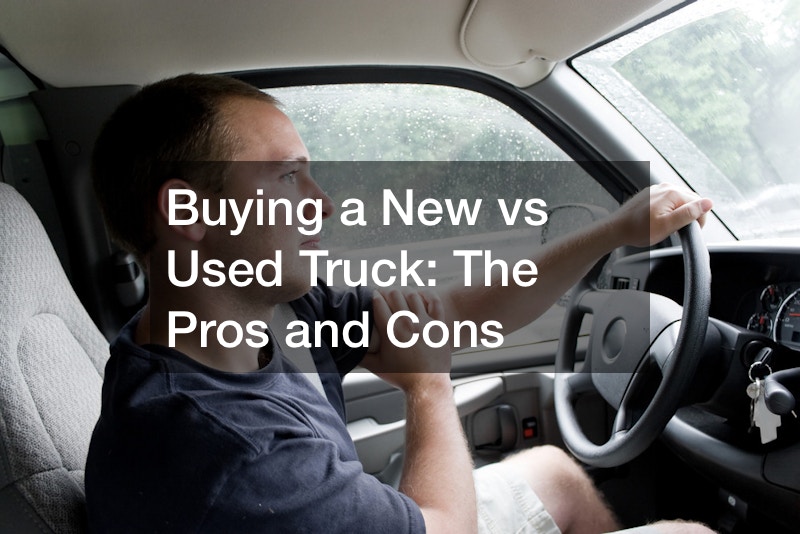
Buying a car is a financial investment that involves several decisions. You must not only choose the brand and model of your truck but also whether you want to purchase a new or used truck. In this article, we’ll look at the pros and cons of buying a new vs used truck.
Used Truck
A used car has been previously owned. Demonstration cars also fall under this category. In this section, we’ll look at the pros and cons of purchasing a used truck to better inform the new vs used truck debate.
Pros
Buying a used car comes with its fair share of pros. These include:
1. Used Trucks Will Save You Money

When deciding between buying a new vs used truck, note that a used car for sale is far cheaper than buying a brand-new one. You’ll find pocket-friendly offers for both overall prices and regular monthly payments and a variety of flexible financing options. A used truck also saves you from the dreadful experience of purchasing a brand-new car and having its market value fall as soon as it leaves the showroom because its cost is already impacted after its initial sale.
Even if a car is just one year old, you can save quite a lot of money. When buying a used car, you may also be lucky to find a seller urgently looking to exchange their car for cash to deal with an emergency. In such a case, you’ll have more room for negotiation. You’ll also likely have a more diverse truck body selection to choose from.
2. Lower Registration and Insurance Costs
The fact that you can expect reduced insurance and registration fees for a used car might just settle the debate of purchasing a new vs used truck. Buying a used truck at a reduced price results in lower insurance costs because a car’s worth is a key determinant of the amount you’ll be required to pay for auto insurance.
Because registration fees are typically affected by the car’s worth at the time of purchase, these expenses will also be lower. All things considered, purchasing a used truck at a reduced price lets you enjoy significant financial savings on these mandatory expenses, which usually increase the overall cost of car ownership.
3. Slower Depreciation
The rate of depreciation is another factor to consider when deciding between a new vs used truck. The value of a brand-new car depreciates by 20% as soon as it’s driven from the car lot. After the first year, this figure may rise to about 30%. So, if you spent $30,000 on a new car, its value will likely depreciate by $9,000 after just one year of use. If you purchase a one-year-old used car instead, you’ll significantly reduce the amount of depreciation your car will experience while in your care.
4. More Financing Options

Consider your financing options when deciding between a new vs used truck. The fact that there are genuinely far more used vehicles on the market than new ones means that even if your credit history is less-than-perfect, you’ll likely find a financing option that works for you and spares you the outrageous monthly payments. You’ll also appreciate a used truck’s lower insurance costs and reduced registry renewals compared to a new truck.
Cons
While buying a used car has its advantages, it also comes with some disadvantages. It’s important to consider these drawbacks to better inform your decision to purchase a new vs used truck. The cons of purchasing a used truck are:
1. Limited to No Warranty
Used trucks are typically sold ‘as-is.’ This implies that you’re solely responsible for any problems it may have. For example, if the battery dies while you’re on your way to the gas station after the purchase, you’ll need to buy a new battery out of pocket. Certain dealerships offer warranties, but they’re typically very limited.
2. Little to No Customization Options
Let’s extend the debate about a new vs used truck even further. If you go for a new car, you have the option of having it custom-made. You can choose from auto wrapping, a custom color, or adding and taking away extra features such as the sunroof. On the other hand, should you purchase a used truck, you get exactly what you see. So, if the car’s radio is of poor quality, you’ll either have to put up with it or have it replaced out of pocket.
3. Potentially Less Safe

Every year, safety laws are reviewed, and as the regulations evolve, automakers are compelled to follow them. As a result, safety features such as tire pressure monitors are included in almost all newer vehicles as standard equipment. If you buy a used car, there’s a possibility you’ll end up with a vehicle that’s not in compliance with the most recent safety regulations.
4. Outdated Technology
Each year, the technology used in cars evolves to new sophistication levels. For example, vehicles went from using CD players to auxiliary plugs and, recently, Bluetooth connections. When you buy a used truck, there’s a chance you’ll end up with one that features older and less reliable technology. This may mean using an old-fashioned CD player rather than a Bluetooth stereo.
5. You Don’t Know the Previous Owners
The fact that you don’t know who owned the automobile before you is one of the main issues with second-hand trucks. It may have been an elderly woman who only drove it to and from the store, or it might have been a reckless teenager who never had the oil changed. Unless you’re buying directly from a seller you have a personal relationship with, there’s no way to tell if the person you’re purchasing it from is being truthful when they say the oil was changed every 3,000 miles, or if it has had auto body repair or body collision repair done before.
6. Potentially High Maintenance

The basic maintenance packages that come with new automobiles allow you to get a free oil change at specific checkpoints, like a 25,000-mileage inspection. This feature is typically not included when buying a used car. It’s your financial responsibility to have oil changes and check-ups done for a used car when necessary, which might be right after you buy it.
7. Earlier-Onset of Problems
When you purchase a new car, you generally won’t encounter mechanical issues for quite some time. You’re unlikely to experience a mechanical breakdown for the first few years, but this isn’t the case with used trucks. Don’t be surprised if you start experiencing issues as soon as you leave the lot. The engine mount may shatter, the truck transmission may slip or the pickup truck running board may break. If you find yourself in such a situation, you’ll, unfortunately, have to cover the cost of broken transmission repair or the engine mount repair, whatever the issue may be.
New Truck
A new car is one that’s sold in its original factory condition. It can also be described as a car with no record of sale or issued title. In this section, we’ll look at the pros and cons of purchasing a new truck.
Pros
Most people prefer to buy a brand-new car from a dealership and for a good reason. After weighing your options for and against a new vs used truck, you quickly realize that a new truck has benefits that go beyond the smell of newness. These include:
1. Enhanced Safety
The fact that newer automobiles have more advanced safety features is a common justification for purchasing a new truck. The advanced computer technology in newer models translates to improved safety features and convenient operation. A new truck is more likely to have features such as stability control, lane and blind-spot monitoring systems, and rear-view cameras.
2. Enhanced Fuel Efficiency
How much you spend on gas each month adds up over time. If your car has improved fuel efficiency, it can save you a significant amount of money in the long term. While most smaller models have been offering this benefit for years, other larger models have not. However, this seems to be changing as newer cars across a range of sizes and models are increasingly offering more economical gas consumption than before.
3. Saves Time
Buying a used car typically involves far more research than a new one. Even after finding a used truck that checks all requirements on your list, you’ll still need to conduct some research to determine if it has a shady title history, or if it was flooded, two things you should be cautious of when buying a used car. Should you decide to have your local mechanic assess the car before you close on the deal, the process can take quite some time. Additionally, you may soon learn that your dream (used) car isn’t the right fit for you, and you have to start the process all over again.
When considering a new vs used truck, settling for the former means you won’t have to worry about this. After finding the truck you want to purchase, the process of determining the final price, payment method, and extended warranty options can start. Once all the paperwork is processed, usually, on the same or the following day, you can hit the road in your brand-new car.
4. You Don’t Have To Worry About Previous Owners
Even though you can get a complete vehicle history check on every used automobile, these records might not give you the whole picture. You don’t have a way of knowing how frequently a car was cleaned, how many drivers shared it, or if the previous owner kept up with maintenance. Buying a new truck means starting fresh without worrying about past owner history. You’re the only owner so far.
5. Better Resale Value
While a new car will depreciate as soon as you drive it from the lot, you’ll get more for it when trading in compared to a used older model. If you sell the car privately, lower mileage and newer features will likely get you a greater trade-in value or a higher sale price.
6. Access to Cutting-edge Features and Technology
Every year, vehicles are fitted with new features. These could be in the form of upgraded safety features or the latest audio equipment. Purchasing a brand-new truck gives you greater access to premium features and accessories from the manufacturer. If you often drive with children in a truck or are worried about other road users, having the most recent safety and technological features gives you peace of mind. Additionally, newer models of your dream car will likely produce fewer emissions and offer better gas mileage compared to older ones.
Cons
While purchasing a new truck has its fair share of pros, it also has several cons. These include:
1. Depreciation Will Hit You Hard
A new truck loses more than 10% of its value the instant you drive it off the lot, implying that it’ll instantly lose between $3,000 to $6,000 of its value after purchase. This is one of the primary reasons gap insurance exists. If you take out a five-year loan to finance the purchase, your new truck will likely be worth around 40% of its initial value by the time you’re clearing the loan, assuming you observe proper maintenance throughout that period.
It will also lose around 20% of its value in the first year alone. That’s why you should always drive your truck with a complete insurance package. If you don’t have one and you get into an accident that totals the car minutes after driving off the lot, you may still be held liable for the loan balance even if you’re left without a working car to use. Your other alternative would be to hire the services of an accident lawyer.
2. Higher Insurance Premiums
Up until the balance is paid in full, every dealership and lender requires you to maintain full coverage on your automobile. The actual premium is determined by your driving record, age, and the brand and model of the car, among other factors. When purchasing a new vs used truck, you’ll always spend more. Even with outstanding driving history, those who drive their car full-time pay at least $1,000 every year to cover their investment.
3. You Don’t Technically Own the Truck Until the Loan is Paid in Full
Once you’ve obtained dealer financing or have received a new car loan from a lender, you’re granted the right to operate and get a license for the vehicle. However, you don’t get a clear title. Until you pay off the balance on your car loan in full, it’s technically not yours. If you default on the loan for whatever reason, which may mean missing just one payment, the lender may decide to seize the vehicle. Your credit score will also suffer, and you won’t have a vehicle, and yet you’ll still be liable for the balance of the loan after the bank sells the truck.
Both new and used trucks have their pros and cons. Before making a final decision between a new vs used truck, weigh both options while staying true to your needs.





